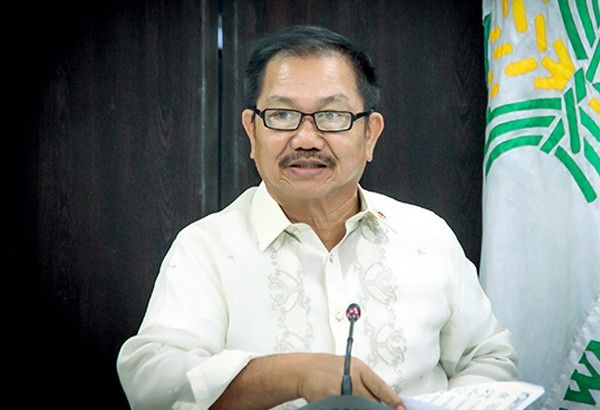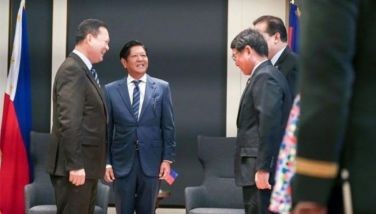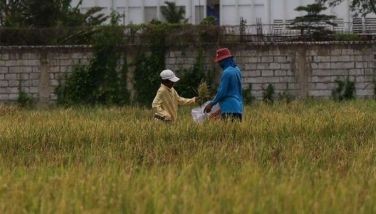YEARENDER: Agri sector posts turnaround, looks forward to 2017

MANILA, Philippines - The country’s agriculture sector, which has been struggling over the past years, is slowly turning around under the Duterte administration and is seen to grow further as the government moves to alleviate poverty and achieve self-sufficiency in rice over the next three years.
After three consecutive declines in output, the local farm sector has picked up pace and performed positively under the leadership of Agriculture Secretary Emmanuel Piñol, who has increased his presence via social media platform Facebook.
Piñol said the road to recovery was not easy as the industry faced various challenges during the second semester which included budget cuts, the dilemma of lifting rice quantitative restrictions, and concerns on smuggling.
“The journey has been tough and hard for us simply because some of our activities were constrained by the fact that the budget for the rest of the year has been allocated for the projects designed by the previous administration,” he said.
“The situation somehow tied our hands in implementing drastic reforms in the agriculture department,” Piñol added.
Upon his appointment, Piñol said he was ready to put his job on the line and offered to resign if the farm industry would not see any improvement in one year.
“Time is precious. There’s no point for me to stay if I don’t improve the growth of the agriculture sector one year after I arrive. I will definitely turn over my post to someone better if we remain stuck in the negative. That’s my promise,” he said.
State of the sector
The industry has been performing poorly in the past years while food prices, particularly rice, rose and poverty increased by almost 30 percent between 2009 and 2015.
To arrest the decline in agricultural production, the agriculture department has undertaken immediate actions such as responding to calamity, providing machineries, activation of mothballed rice processing centers and utilization of Agri-Pinoy trading centers, among others,” Piñol said.
“We have started drafting long-term programs which will serve as foundation of the new agriculture and fisheries under the administration and even beyond,” he added.
The DA is also beefing up its thrust toward achieving rice self-sufficiency by 2019 through the involvement of local government units (LGUs) on rice production. Its goal is to eventually eliminate the country’s dependence on imported rice.
The agency’s rice program called LGU Corporate Rice Farms aims to eliminate the interference of middlemen who control the buying price of palay and manipulate the selling price of rice in the market.
To recall, the finance team of the Department of Budget and Management did not approve the P18 billion flagship Rice Productivity Enhancement (RIPE) program, the first tranche of the three-year rice program worth P64 billion that would focus on rice production including seeds, inputs, new areas, irrigation projects and fertilizers.
To address the shortage on infrastructure development, the DA is set to utilize the $450-million rural development project expansion to be funded by the World Bank.
The agency is spending P5 billion to boost the local abaca production over the next five years.
About 20 large private companies have also pledged an initial P3-billion worth of investments with the DA to alleviate poverty and bring socio-economic developments in the war-torn Sulu Island of Mindanao.
The DA has likewise invested P131 million for seeds to intensify hybrid rice expansion in Mindanao as part of efforts to increase farmers’ income.
Apart from this, agency has started the Color-Coded Agriculture Guide Map which will determine the crops or agricultural activities that would be best suited in a specific area based on geographic, climatic and soil type conditions.
Lingering problems
One of the biggest issues the DA faced and continues to face is the removal of the quantitative restriction (QR) on rice imports effective beginning July next year.
Piñol and the National Economic and Development Authority (NEDA) clashed after Socioeconomic Planning Secretary Ernesto Pernia maintained the government would import more rice to comply with the World Trade Organization agreement to lift barriers on the staple food despite opposition from the DA.
While Piñol has made public his stand on seeking another extension of the QR by least two more years, the Office of the Cabinet Secretary said it was too late to do so.
Even agri-related agency National Irrigation Administration (NIA) said the Philippines should prepare for the open market regime.
“But the problem is that our farmers cannot compete with farmers of other countries because they have a lot of assistance and subsidies. We are not at par with our other ASEAN neighbors like Vietnam, Thailand and Cambodia,” NIA chief Peter Tiu Laviña said.
He said other countries have long been implementing free irrigation, an essential component to farming, while the Philippines is just about to provide the free service next year.
NEDA-Agriculture, Environment and Natural Resources director Mercedita Sombilla said as the Philippines eventually moves to a no QR regime, support should be utmost to small farmers especially to raise their yield levels.
But whether the rice QR is extended or allowed to expire, the agri chief has laid down major initiatives to be established including a major push to enhance the industry’s innovation and technology.
The DA aims to increase support to rice science and technology and closely coordinate with local government units in revitalizing the national and local extension service systems.
“We will be putting more science on the ground and in the hands of farmers by starting with the basics – the roll-out of the recently completed color-coded guide maps that contains most of the detailed and location-specific information of importance to agriculture such as soil crop suitability, natural hazards, among others,” Piñol said.
The agency will also complete its rural infrastructure program particularly farm-to-market roads and improve farm mechanization to lower production costs and increase efficiency.
Piñol also plans to revive Masaganang Ani 6000 program, a comprehensive rice production support initiative that aims to attain an average yield of six metric tons (MT) per hectare .
Furthermore, NEDA said the government should depend on technologies that are in advanced stages of development, including climate-smart technologies that are more resilient to severe and extreme climate conditions which should be done in areas that are conducive to cultivating rice.
New investment in irrigation expansion and rehabilitation of existing systems is also critical in increasing yields and adapting to climate change and improving foodie unity.
“Transport facilities should be greatly improved to overcome current logistics difficulties. They could also help get farmers move into the supply-value chain processes and partner with private agri-business,” Sombilla said.
The QR has allowed the government to limit the volume of rice that could be?imported by the Philippines every year. It protects local farmers by preventing the influx of cheap rice?imports.
In 2014, the Philippines under former president Benigno Aquino III obtained a favorable response from the World Trade Organization in its bid to extend the use of QR to 2017.
The Philippines appealed for an extension of the QR on rice three times.
The extended QR slaps a 35-percent duty on imported rice under a minimum access volume (MAV) of 805,200 metric tons (MT).
The government imposes a higher tariff of 50 percent on imported rice outside of the MAV limit.
Piñol said the country has the potential to become a rice exporting nation.
Quo Vadis
While it is quite impossible to hit the 3.5 to five percent growth target this year, the industry is still up for a much bigger growth in 2017.
Piñol expects the sector to grow by as much as seven percent following the re-opening of major markets as well as the investment commitments from different countries during President Duterte’s recent state visits.
The DA and Farmind Corp. have signed an agreement with a Japanese firm for the supply of 20 million boxes of bananas annually which is expected to translate to about P5 billion in revenue.
“The signing of the agreement will mark the start of the development of about 7,000 hectares of banana farms which Farmind would like to be located in former conflict areas in the Southern Philippines,” Piñol said.
The DA is also eyeing a P900-million equipment loan from the Japanese government for the modernization of the sector to reduce post-harvest losses and ensure increased productivity.
What else needs to be done
Former agriculture chief William Dar suggested the creation of a five-year strategic roadmap for the sector.
“We need to institutionalize agribusiness as a strategy for agricultural development,”Dar told The STAR.
He said the Philippines should continue its trade and economic relationship with the West and strengthen relations with China and Russia.
Calata Corp., for its part, said there was a need to educate farmers to become entrepreneur agriculturalists and the government should prioritize teaching the young ones in order to resuscitate the endangered farming industry.
“The farmer is a dying breed and we need to infuse young blood. The government should support the proliferation of modern farming methods, build post harvest facilities, construct more farm-to-market roads and completely stop illegal importation of agricultural goods,” said Calata president Joseph Calata.
The International Fund for Agricultural Development (IFAD) said making the agriculture industry appealing to the younger generation is one of the many ways to ensure food security not just in the Philippines but also in Asia-Pacific as well.
“We need to give the young people the opportunity to be interested in agriculture. Rural space is a productive space, if used well and combined with technology, that can generate income,” IFAD Asia-Pacific director Honnae Kim said.
Non-government organization Oceana Philippines lauded Piñol and his department for the strategic and action-oriented initiatives undertaken since July, intertwining food security with climate resiliency.
But Oceana VP Gloria Ramos is hopeful Piñol will agree with the creation of a separate agency that will oversee fisheries and aquatic resources, removing it under the umbrella of the DA.
“We hope the secretary will be persuaded to agree to the establishment of a separate Department of Fisheries as it is much-needed at this particular when our principal fishing ground is overfished” Ramos told The STAR.
- Latest
- Trending




























